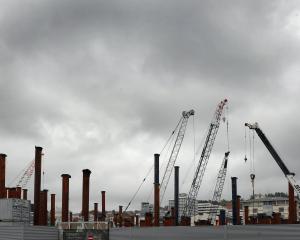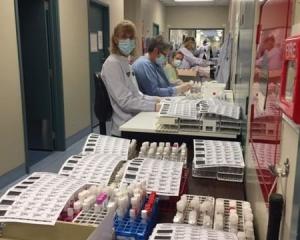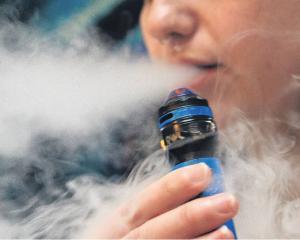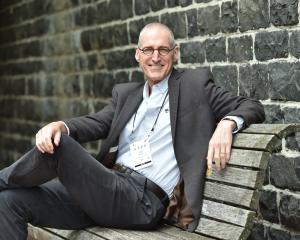
Lucas Rakasz has worked in several prominent English hospitals, has helped train neurosurgeons, and volunteered to help on Covid-19 wards at the height of the first wave of the pandemic.
However, much of his training for the surgical specialty was received in his native Hungary and, despite being deemed qualified to operate in Britain, Dr Rakasz has been knocked back by the New Zealand Medical Council in his bid to become a specialist neurosurgeon in Dunedin.
"I want to make a contribution as a permanent resident of this country. I don’t see myself as a guest," he said.
"I don’t think I am getting a fair and transparent decision here ... If no-one is appointed as a neurosurgeon here, the service is going to die."
The council-convened panel initially decided Dr Rakasz’s experience was not "equivalent to, or as satisfactory as, a New Zealand-trained doctor" and rejected his application.
Dr Rakasz, who during an earlier stint in New Zealand worked at Waikato Hospital, is registered as a general medical doctor in this country and able to work at that tier of the profession.
The medical council’s position has dumbfounded two British surgeons who provided glowing references recommending Dr Rakasz.
" I do not know the reasons for refusal to recognise his training," University of Birmingham neurosurgery professor Colin Watts told the Otago Daily Times.
" He was employed by UK National Health Service so had to meet criteria. His Hungarian training did not seem to be an issue."
Alistair Jenkins, a consultant neurosurgeon at the Royal Victoria Infirmary, in Newcastle, is the president of the British Neurosurgical Society, and also one of Dr Rakasz’s trainers.
"He had high-level support from some of the most prominent surgeons in the biggest units in the country, and the level and extent of his training is unimpeachable," Mr Jenkins said.
"I am well aware of the small island exceptionalism which makes New Zealand feel that training, or indeed anything, elsewhere must be inferior.
"It is an arrogant mindset which impedes progress and globalisation and in this case, common humanity."
Medical council chairman Curtis Walker said as the matter was before the court he was limited in what he could say about the case.
"The council has said that it is prepared to have another look at the question of whether Dr Rakasz’s [training] is comparable.
"Council has rescinded its decision to decline his application and has offered to convene an entirely new panel to consider the matter afresh, including a further interview with Dr Rakasz.
"Dr Rakasz has not taken up council’s offer to do this and has decided to proceed with his appeal in court."
The southern neurosurgery service is meant to be staffed by three neurosurgeons but it has never had a full complement of doctors.
For the past three years just one neurosurgeon, Ahmed Taha, has worked in Dunedin, and doctors in Christchurch have had to treat patients if he is unwell or on leave.
Dr Rakasz, whose family have settled with him in New Zealand, is now resigned to having to leave the country to find specialty work in his chosen field, but said he was continuing his case on behalf of other overseas-trained doctors in similar straits.
"I have a deep feeling of injustice ... I became a doctor because I believe I was placed here to help people and my patients and the people of Dunedin deserve this service.
"They don’t deserve to have to fly to Christchurch for treatment.
"I believe people here need a good, stable service with well-trained surgeons to look after them, and having been trained in different systems I believe I can help improve things here."
Comments
Unusual clarity of thinking from a member of the medical profession: "I am well aware of the small island exceptionalism which makes New Zealand feel that training, or indeed anything, elsewhere must be inferior. It is an arrogant mindset which impedes progress and globalisation and in this case, common humanity."
Indeed. Although this particular case seem more likely to be driven by a more rational impulse: the closed shop is the one principle of economics that's always been well understood by NZ medical leaders.
"I am well aware of the small island exceptionalism which makes New Zealand feel that training, or indeed anything, elsewhere must be inferior.
"It is an arrogant mindset which impedes progress and globalisation and in this case, common humanity."
That's not nice nor accurate
It's NOT New Zealand that feels that way.
It IS a small group of people, that have embedded themselves into positions of power and their number has been increasing over recent years.
Yes, the people of NZ are paying a very high price allowing them to stay there.
It needs fixing !!!!
Sadly, it is very true and has been for a long time. In so many areas NZ training is certainly no better, and often less stringent than other developed countries. Medicine and nursing are good examples, along with many of the trades. In all of these areas we are desperate for skilled staff but our narrow-minded approach gets in the way.
Words fail me. Tell me there's another side to this story please. Our medical council surely can't be as arrogant as this story portrays them.
Or does the NZ council really think the standards applied by the NHS in the UK to be inferior to their own?
This isn't the first case by any means. Hopefully pushing the MCNZ on this will get some much needed changes.
It is often difficult to comparing qualifications from different countries, especially when they are from non-English speaking. I am aware of two orthopaedic surgeons who came to NZ from Croatia as refugees. One of them drove taxis until they learned English and retrained. Another example of qualifications not being recognised is the UK driver’s licence. UK driving is far more challenging than NZ. However, the licence is only valid for a year and has to be replaced with a NZ licence, which is only given following a successful Road Code test. It is better to be safe than sorry!
and we wonder why there is a shortage of medical professionals in this country ......arrogance and ignorance from our nz medical teams....for sure












